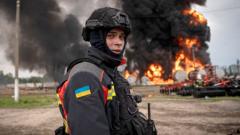In the wake of Russia's full-scale invasion of Ukraine, photojournalists have stepped forward, capturing not only the grim realities of war but also moments of humanity amidst chaos. Over the past three years, hundreds of photographers have documented the consequences of conflict in both civilian and military contexts. Notable among these are the husband-and-wife duo Vlada and Kostiantyn Liberov, previously wedding photographers in Odesa, who shifted their focus to recording the harsh realities of war, including Russian war crimes.
Vlada recalls an instance of life-threatening violence, where an explosion left her with shrapnel that doctors could not remove. Kostiantyn captured a powerful image of a soldier grieving a comrade killed in action, emphasizing the complex emotional landscape of military operations conducted beyond Ukraine's borders. "It's painful," Vlada admits, noting that discussions about such traumas often go unspoken among colleagues. Their experiences symbolize the moral burdens often carried by those shedding light on the ravages of war.
Valeria Demenko, who has been documenting the efforts of Ukraine's state emergency service, recalls the harrowing duty of rescue workers on the front lines in Sumy. She describes a particularly haunting moment, where rescue efforts revealed a child’s doll in the rubble of a shell-struck residential building, a grim reminder of the human cost of destruction. Despite the emotional toll, she remains committed to showcasing the consequences of Russia's actions, embodying the resolve of many local photojournalists.
Alexander Ermochenko shares his perspective on the war documenting the suffering faced on both sides. His work, including images from the heavily affected Donetsk region, reflects the universal pain of loss, regardless of allegiances. Despite restrictive access imposed by the Kremlin on independent media, Ermochenko's passion for storytelling drives him to capture critical events in real-time, highlighting the monumental impact of sudden, life-altering moments.
Alina Smutko, based in Kyiv, poignantly expresses the strain of witnessing her city suffer repeated attacks, emphasizing the mental burden carried by journalists who document these tragedies while also worrying for their safety and that of loved ones.
As Ukrainian photojournalists navigate the complexities of this protracted conflict, they continue to illustrate the deep emotional scars left by war and the moments of resilience that spark hope amidst despair. Their narratives, filled with both loss and the celebration of survival, underscore the importance of visually documenting history as it unfolds.
Vlada recalls an instance of life-threatening violence, where an explosion left her with shrapnel that doctors could not remove. Kostiantyn captured a powerful image of a soldier grieving a comrade killed in action, emphasizing the complex emotional landscape of military operations conducted beyond Ukraine's borders. "It's painful," Vlada admits, noting that discussions about such traumas often go unspoken among colleagues. Their experiences symbolize the moral burdens often carried by those shedding light on the ravages of war.
Valeria Demenko, who has been documenting the efforts of Ukraine's state emergency service, recalls the harrowing duty of rescue workers on the front lines in Sumy. She describes a particularly haunting moment, where rescue efforts revealed a child’s doll in the rubble of a shell-struck residential building, a grim reminder of the human cost of destruction. Despite the emotional toll, she remains committed to showcasing the consequences of Russia's actions, embodying the resolve of many local photojournalists.
Alexander Ermochenko shares his perspective on the war documenting the suffering faced on both sides. His work, including images from the heavily affected Donetsk region, reflects the universal pain of loss, regardless of allegiances. Despite restrictive access imposed by the Kremlin on independent media, Ermochenko's passion for storytelling drives him to capture critical events in real-time, highlighting the monumental impact of sudden, life-altering moments.
Alina Smutko, based in Kyiv, poignantly expresses the strain of witnessing her city suffer repeated attacks, emphasizing the mental burden carried by journalists who document these tragedies while also worrying for their safety and that of loved ones.
As Ukrainian photojournalists navigate the complexities of this protracted conflict, they continue to illustrate the deep emotional scars left by war and the moments of resilience that spark hope amidst despair. Their narratives, filled with both loss and the celebration of survival, underscore the importance of visually documenting history as it unfolds.


















